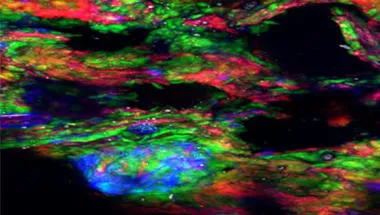
Professor Paul Sharp
Professor of Nutritional Sciences
Research interests
- Nutrition
Biography
Paul Sharp is Professor of Nutritional Sciences at King’s College London, as well as the former Head of Department of Nutrition & Dietetics. He has worked on the mechanisms regulating nutrient absorption and metabolism for over 25 years. His current work addresses the impact of biofortification, agronomic practices, and food processing methods on the content and localisation of micronutrients in cereals and vegetables, and the bioaccessibility and bioavailability of vitamins and minerals from plant-based foods. He has expertise in the fundamental mechanisms controlling iron metabolism at the cellular level and how these processes are regulated at nutrigenomic and epigenetic levels. His work has been funded by awards from UKRI, UK charities and industry and his team are currently partners on several international GCRF collaborations on mineral bioavailability.
Research

Metal Metabolism Research Group
The Metal Metabolism Research Group aims to understand the roles of minerals in biology, health and disease. Much of our work is mechanistically based and involves studies at the molecular and cellular levels as well as animal model systems and human. Our research focus is currently on iron and zinc.

Innovation for Safe and Sustainable Food, Nutrition and Health
This Research Interest Group on Innovation for Safe and Sustainable Food, Nutrition and Health provides a unique opportunity for the King’s research community to address the challenges of sustainable food development.

Phytochemicals
Phytochemicals are plant secondary metabolites. Currently, more than 10000 different types of phytochemicals have been identified, and many still remain unknown.

Bioaccesibility & bioavailability of nutrients and bioactives
Iron deficiency (ID) and iron-deficiency anemia (IDA) are global problems that affect more than 2 billion people accounting for 0.8 million deaths annually worldwide. Consequently, sustainable food-based approaches are being advocated to increase the intake of foods with high iron content and bioavailability.

Mineral nutrition and metabolism
Since trace elements are involved in virtually all biological processes, biometals research is relevant and can be applied across the areas of biomedical and health research.
Research

Metal Metabolism Research Group
The Metal Metabolism Research Group aims to understand the roles of minerals in biology, health and disease. Much of our work is mechanistically based and involves studies at the molecular and cellular levels as well as animal model systems and human. Our research focus is currently on iron and zinc.

Innovation for Safe and Sustainable Food, Nutrition and Health
This Research Interest Group on Innovation for Safe and Sustainable Food, Nutrition and Health provides a unique opportunity for the King’s research community to address the challenges of sustainable food development.

Phytochemicals
Phytochemicals are plant secondary metabolites. Currently, more than 10000 different types of phytochemicals have been identified, and many still remain unknown.

Bioaccesibility & bioavailability of nutrients and bioactives
Iron deficiency (ID) and iron-deficiency anemia (IDA) are global problems that affect more than 2 billion people accounting for 0.8 million deaths annually worldwide. Consequently, sustainable food-based approaches are being advocated to increase the intake of foods with high iron content and bioavailability.

Mineral nutrition and metabolism
Since trace elements are involved in virtually all biological processes, biometals research is relevant and can be applied across the areas of biomedical and health research.
